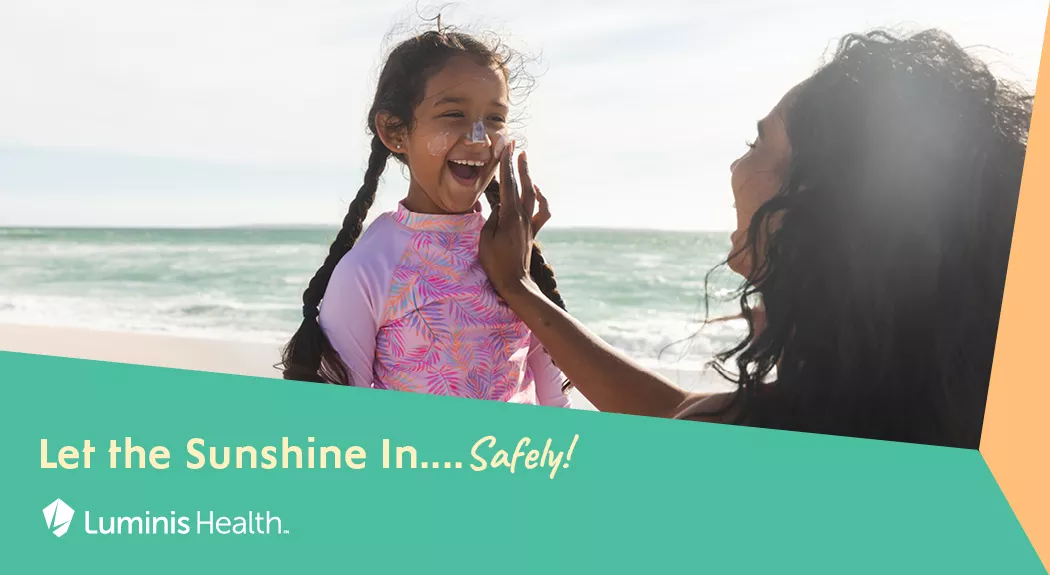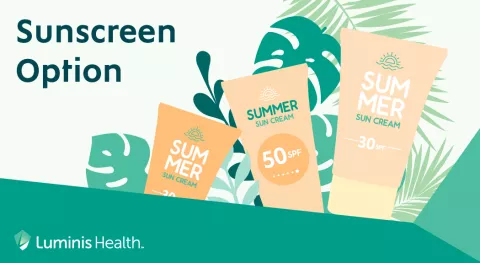
The dog days of summer have arrived and, fittingly, August is Summer Sun Safety Month. For many, it is the peak season to be outside having fun in the sun. But along with the heat and late summer sunshine comes the importance of remembering to stay hydrated and remain diligent about sunscreen application.
The Importance of Sunscreen
Sunscreen helps prevent skin damage from the sun’s powerful ultraviolet (UV) rays, which can lead to skin cancer, discoloration and wrinkles over time.
There are two types of UV rays:
- Ultraviolet A (UVA) has a longer wavelength. It is associated with skin aging.
- Ultraviolet B (UVB) has a shorter wavelength. It is associated with skin burning.
While UVA and UVB rays differ in how they affect the skin, they both can harm you. Unprotected exposure to UVA and UVB damages the DNA in skin cells, producing genetic defects, or mutations, that can lead to skin cancer and premature aging. UV rays can also cause eye damage, including cataracts and eyelid cancers.Everyone should wear sunscreen daily, year-round. UV rays and sun damage do not discriminate and can cause harm to people of all races and colors, even in the winter when up to 80% of the sun’s UV rays can reflect off snow causing sun damage. It is important to apply sunscreen to your face daily, as you are exposed to the sun even when you don’t realize it, such as when driving. If you are going to be outside in full sun, sunscreen should be applied liberally to your entire body.
Types of Sun Protection
There are two major types of sunscreens: chemical sunscreen and sunblock. Chemical sunscreen—which is what we normally refer to as sunscreen—filters the sun’s UV rays, only allowing some to get in. In contrast, sunblock—also known as physical sunscreen—reflects the sun’s UV rays and blocks them from penetrating the skin. Sunscreens usually contain oxybenzone or avobenzone, while sunblock has titanium oxide or zinc oxide. Both are effective at protecting your skin from the sun’s UV rays.
SPF (Sun Protection Factor) refers to the percent of UVB rays that are blocked. SPF 15 blocks about 15% of UVB radiation, while SPF 30 blocks about 97%. Any sun protection above SPF 30 offers negligible additional production from UVB rays.
Sunscreen Recommendations
Skin care experts recommend using a broad-spectrum sunscreen or sunblock that is at least SPF 30. Broad-spectrum sunscreen provides protection against both UVA and UVB rays. For optimal sun protection, use sunscreen or sunblock that contains titanium dioxide and zinc oxide. Wear waterproof sunscreen if you plan to spend time in the water or sweat and reapply at least every two hours, regardless of SPF coverage. It should be reapplied even more frequently if swimming or sweating.
Make It a Habit
Including sunscreen in your daily skin care regimen is a helpful way to make it a regular practice. A variety of skincare products contain sunscreen, including skin moisturizers, makeup primer and foundation. These are easy ways to incorporate sunscreen application into your daily routine so that you can enjoy outside activities safely, any time of the year.
Stop by the Luminis Health booths at Bowie Baysox games on August 18 and 19 to pick up a travel-size sunscreen for UV protection on the go!
This post was originally featured in the Enquirer-Gazette.
Lauren Eisenbeis, MS, PA-C, is the lead plastic surgery physician assistant at Luminis Health.



